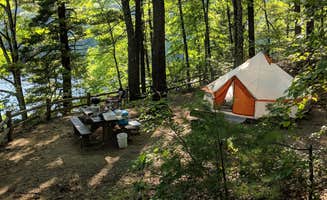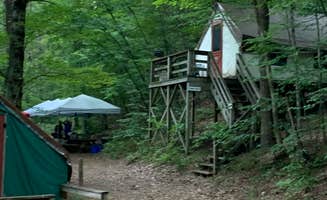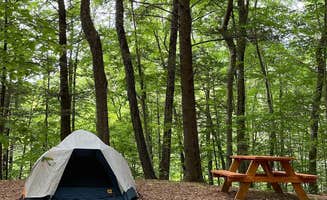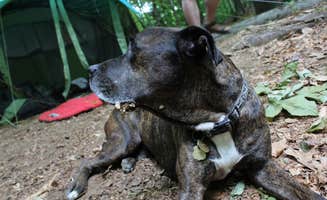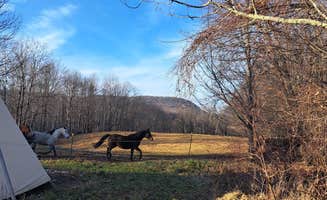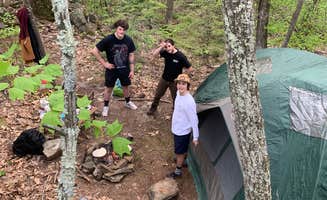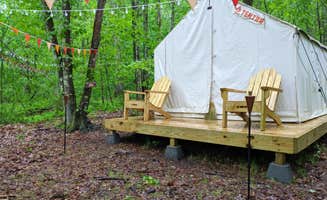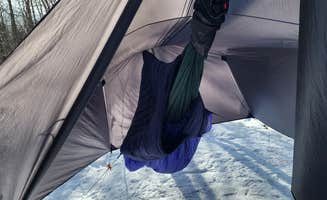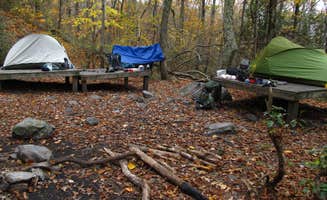Tent camping near Whately, Massachusetts offers quiet woodland settings within the Connecticut River Valley, where elevations range from 200 to 400 feet above sea level. Most campsites in this region experience seasonal temperature ranges from 30°F in spring and fall to 80°F during summer months. Cell service varies significantly across the valley, with stronger signals at higher elevations and near highways.
What to do
Paddle the waterways: Tully Lake Recreation Area provides canoe and kayak rentals directly at the campground for exploring the lake. As one camper notes, "We take our canoe and spend the whole day at the lake. You can find lots of private areas to swim, pick blueberries and relax."
Whitewater adventures: Zoar Outdoor in Charlemont (30 miles northwest of Whately) connects campers with guided river excursions. "The campground is connected to an adventure/outing company that provides white water rafting, tubing and other water activities on a nearby river," explains one visitor.
Hiking options: Multiple trail networks surround Whately, including routes near Federated Womens Club State Forest where historic cellar holes from 1930s-era towns can be explored. "If you continue past site 15, you'll head through Gate 36 out toward Soapstone Hill which offers a great view of Quabbin Reservoir and sunsets," reports one hiker.
Waterfall exploration: Several cascades dot the region, particularly near the campgrounds. "If you'd like to hike with children, there is an easy hike close to the entrance, along Doane's Falls, a series of 5 waterfalls along an ascending path through a wooded area."
What campers like
Privacy between sites: Tully Lake Recreation Area offers well-spaced campsites. One camper reports, "We stayed at site 1, which was HUGE and extremely private. Sites closer to the water that we saw were less private, but still very peaceful and spread out."
Unique accommodation options: Beyond standard tent sites, the region offers specialized camping experiences. At Chester Railway Station, campers can stay in a converted caboose: "It sleeps 4 and you can set up tents outside too. You hear the trains running at night. Very clean and comfortable."
Lakefront access: Water-adjacent sites provide direct entry for swimming and paddling. A camper at Tully Lake notes, "The camp's minimal store sells ice cream and a (very) few sundries, so come prepared." The same location offers "canoes and kayaks available for rental. Volleyball and horseshoes are near the entrance."
Farm settings: Some private campgrounds operate on working farms, providing a different experience than state-run facilities. At Maple Ridge Farm, "They have a common room that has games and eggs for sale. Toilet and shower were very clean. Very lush campground, plenty of space and privacy between sites."
What you should know
Weather preparation: The region experiences significant seasonal variation. From late May through early September, temperatures typically range from 60-85°F with frequent afternoon thunderstorms. Spring and fall camping requires preparation for overnight temperatures that can drop below 40°F.
Cart-in requirements: Many campgrounds require gear transportation from parking areas. At Barton Cove Campground, the logistics can be challenging: "Only real annoyance was dealing with set up and take down of the campsite... It's a bit of a hassle but worth it."
Limited facilities: Most tent sites have minimal amenities. At Federated Womens Club State Forest, "Bring your own water. There is a composting toilet located near the group site in the field." Similarly, at many locations "there's no formal swimming area and you can't swim at the boat launches, but you are able to swim from your campsites."
Reservation timing: Popular sites book quickly during peak season (Memorial Day to Labor Day). As one camper explains, "The sites fill up weeks out (and can completely fill the day registration opens, which is date-dependent each year...Booking for Memorial Day meant I booked in April)."
Tips for camping with families
Cart considerations: When camping with children at cart-in sites, pack strategically. At Tully Lake, "Our site was fairly far from services, long run with small kids in the middle of the night." Another camper advises, "The sites near the water or on bluffs are further away, and though they provide carts the trails can make hauling them tough. Keeping gear to a minimum is a good idea."
Kid-friendly activities: Several campgrounds offer recreational amenities. "Disc golf course is also near the dam and was seeing a fair amount of activity," notes one visitor to Tully Lake. At Zoar Outdoor, staff organize various programs: "Everyone is so knowledgeable and helpful and kind. They really seem to care about what they do, and it shows."
Car-free camping benefits: Walking-only campsites create safer environments for families. "No cars at all at the campsites, which was great for peace of mind as our toddler roamed around. It also made for a super quiet stay," reports one parent after visiting Tully Lake.
Bathroom planning: Centralized facilities require advance planning with children. One family camper advises, "The bathrooms are located near the entrance to the Park, and include flush toilets as well as coin operated, hot showers, open 24/7. From some of the sites, this will be a long walk during the night."
Tips from RVers
Size limitations: Most tent campgrounds near Whately cannot accommodate large RVs due to narrow access roads and walk-in site designs. At Sodom Mountain Campground, recent improvements have made access easier: "All roads are dirt and all potholes have been repaired," though larger RVs should call ahead to confirm specific site measurements.
Alternative options: RV campers seeking hookups should consider commercial campgrounds further from Whately. State parks and forests primarily offer tent-only sites with limited or no electrical access. Most tent-focused campgrounds like Barton Cove provide only "rustic camping - sites have tent platforms, grill, fire pit and picnic tables" without RV accommodations.


